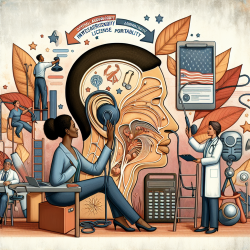As a dedicated professional in the field of speech-language pathology, you understand the critical role of continuous professional development and staying abreast of regulatory changes. One of the pressing issues facing occupational audiologists today is licensure portability, as highlighted in the research article titled "Letter to the Editor: Licensure Portability for Occupational Audiologists is Essential" by George R. Cook. This blog aims to elucidate the importance of licensure portability and how you can implement these findings to enhance your professional practice.
Occupational audiologists are responsible for overseeing industrial hearing conservation programs and ensuring compliance with various regulatory bodies such as the Occupational Safety and Health Administration (OSHA), Mine Safety and Health Administration (MSHA), and the Federal Railroad Administration (FRA). The multifaceted nature of these programs often requires audiologists to obtain licensure in multiple states, a process that is both time-consuming and costly.
According to Cook (2017), the principal audiologist at Workplace Integra, Inc., is licensed in 25 states, with other staff audiologists holding multiple state licenses as well. This redundancy in licensure requirements poses several challenges:
- High Costs: Annual fees for maintaining multiple state licenses can range from $3,000 to $3,500.
- Time-Consuming: The process of obtaining and renewing licenses, along with meeting Continuing Education Unit (CEU) requirements, is labor-intensive.
- Risk of Non-Compliance: Miscalculating renewal dates or engaging in telepractice without the appropriate state license can lead to disciplinary actions.
Given these challenges, it is imperative for the American Speech-Language-Hearing Association (ASHA) to advocate for multistate licensure for speech-language pathologists and audiologists. Such a move would streamline the licensure process, reduce administrative burdens, and allow professionals to focus more on delivering quality care.
As a practitioner, here are some actionable steps you can take to address the issue of licensure portability:
- Stay Informed: Keep abreast of the latest regulatory changes and licensure requirements in the states where you practice.
- Advocate for Change: Join professional organizations like ASHA and participate in advocacy efforts to promote multistate licensure.
- Utilize Technology: Leverage telehealth platforms to expand your reach while ensuring compliance with state regulations.
- Collaborate with Colleagues: Share resources and best practices with fellow audiologists to navigate the complexities of licensure.
By implementing these strategies, you can mitigate the challenges posed by licensure redundancy and contribute to the advancement of the profession. To read the original research paper, please follow this Letter to the Editor: Licensure Portability for Occupational Audiologists is Essential.










